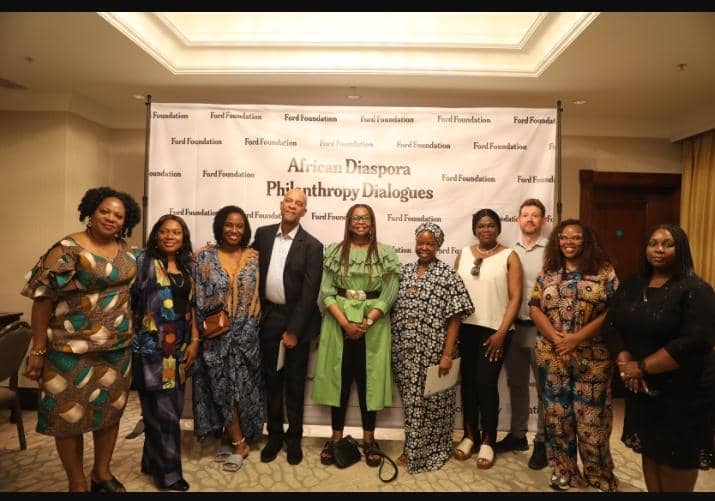By Uche Usim
In a momentous gathering aimed at reshaping the future of philanthropy in Africa, the Ford Foundation Office of West Africa (OWA), in partnership with PaTiTi Consulting, hosted the inaugural African Philanthropy Dialogues in London yesterday. The event, a pioneering initiative, brought together thought leaders, philanthropists, and key stakeholders from the African diaspora to explore innovative strategies and alternative approaches to addressing the continent’s most pressing challenges. The dialogues marked a significant step towards redefining the role of African philanthropy in an era where traditional foreign aid is waning, and the need for homegrown solutions has never been more critical.
The discussions at the London convening revolved around the pivotal role that Africans in the diaspora can play in creating sustainable and transformative change in Africa. As foreign donor funding to African civil society organizations (CSOs) continues to decline, the urgency of building strong partnerships with local CSOs and non-governmental organizations (NGOs) has become increasingly apparent. The dialogues underscored the importance of leveraging the deep connections, cultural understanding, and local expertise that these organizations bring to the table, positioning them as essential drivers of meaningful progress across the continent.
Dr. ChiChi Aniagolu-Okoye, the Regional Director of the Ford Foundation OWA, set the tone for the event with a passionate call to action. She emphasized the foundation’s commitment to engaging Africans in the diaspora in a meaningful conversation about the future of philanthropic giving. “We are eager to spark a dialogue that challenges the diaspora to rethink their approach to giving,” she said. “It is time to ignite a renewed interest in addressing the development challenges that our continent faces. One of the key issues we must address is how to encourage the diaspora to channel their philanthropic efforts through local CSOs in Africa. These organizations are uniquely positioned to drive the change we envision because they are deeply rooted in their communities, understand the nuances of local issues, and have established networks with governments and other key stakeholders.”
The keynote address was delivered by Mrs. Theo Sowa, a highly respected figure in African philanthropy and the former Director of the African Women’s Development Fund (AWDF). In her powerful speech, Mrs. Sowa challenged the prevailing narratives of distrust that often hinder collective action among Africans. “The time has come for us to move beyond individual acts of charity and embrace a more strategic approach to diaspora giving,” she asserted. “Philanthropy in Africa must evolve to become a force that drives lasting development, strengthens institutions, and leads to a self-sustaining continent. We must reject the mindset that we cannot trust ourselves to solve our own problems. Across Africa, there are countless examples of organizations that are making a significant impact through philanthropic initiatives. These successes are a testament to what can be achieved when the right support is provided.”
A fireside chat provided an opportunity for participants to hear firsthand accounts of the transformative potential of diaspora funding when directed through local CSOs. Adam Heal, Director of Stakeholder Democracy Network (SDN), and Dabesaki Mac-Ikemenjima, Senior Program Officer at the Ford Foundation OWA, shared compelling stories of how such funding has led to real and lasting change on the ground. Their insights highlighted the critical importance of local knowledge and community-driven approaches in the success of philanthropic efforts in Africa.
The event also featured a dynamic panel discussion on the theme “Sustainable Philanthropy: Creating Lasting Impact,” moderated by Innocent Ischei, Director of ACIOE Associates. The panelists—Dr. ChiChi Aniagolu-Okoye; Dr. Chukwuka Monye, Managing Partner of Ciuci Consulting; Imma Ndey, People Leader at Accenture; and Kenny Washington—brought a wealth of experience and diverse perspectives to the table. They shared practical lessons from their efforts to tackle social and economic issues across Africa, providing valuable insights into the challenges and opportunities within the philanthropic landscape. The panelists also addressed the systemic hurdles that can sometimes impede the progress of philanthropic initiatives, urging those present to take an active role in overcoming these obstacles.
As the session drew to a close, the panelists issued a powerful call to action. They urged participants to play an active role in redefining philanthropy in Africa, emphasizing the need to trust and empower the men and women on the ground who are working tirelessly to create positive change. “The future of African philanthropy depends on our ability to collaborate, innovate, and support those who are closest to the issues we seek to address,” Dr. Aniagolu-Okoye noted in her closing remarks.
The Ford Foundation’s commitment to building a more sustainable philanthropic ecosystem in Africa was a central theme throughout the event. Dr. Aniagolu-Okoye highlighted several ongoing initiatives, including the foundation’s local philanthropy engagements and match funding efforts, which are designed to amplify the impact of African-led philanthropic activities. She also announced an exciting new collaboration with the Lagos Business School, aimed at developing a capacity-building program for philanthropists and foundation leaders. This initiative will focus on creating curricula that are tailored to the specific needs of their organizations, ensuring that they are well-equipped to drive meaningful change.
The African Diaspora Philanthropy Dialogues is part of the Ford Foundation OWA’s broader Sustainable Philanthropy Dialogue series, which seeks to strengthen the support ecosystem for philanthropy in Africa. The series aims to create the conditions necessary for philanthropy to thrive, fostering greater cooperation between stakeholders and addressing the challenges that stand in the way of achieving the Sustainable Development Goals (SDGs) by 2030. As the dialogues continue to unfold, they promise to play a crucial role in shaping the future of philanthropy on the continent, bringing Africa closer to realizing its full potential.
